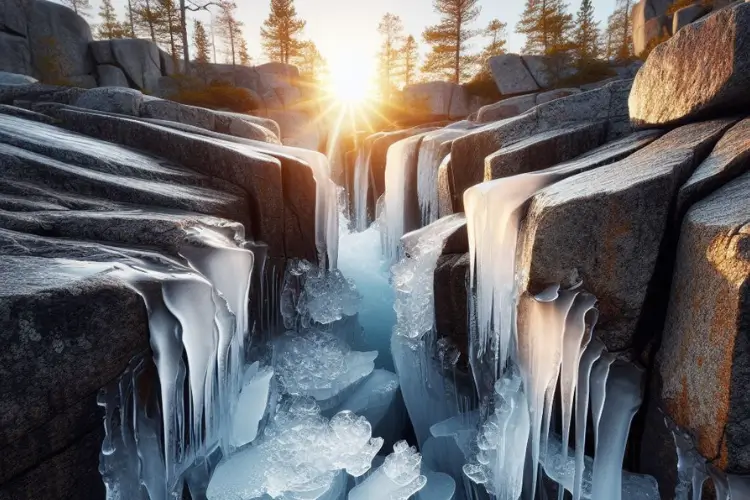You can split a rock when you dip it in the water and decrease the water temperature. The reason is up to 9% expansion as it covers more area when frozen. When there is an increase in volume, the pressure will increase on the rock.
What are cracks in rocks called?
Fissures are the other name for the cracks in the rocks. Most rocks have invisible fissures. Some of them are visible to the naked eyes also.
What is mechanical weathering?
You can use this process to remove the upper layer of the rocks using physical force or chemical reactions. You can employ many things to complete the process as some chemicals make the rock surface brittle.
Animals can use mechanical ways to split the rock’s surface. Plants can also crack the rock structure when they grow in them.
Does water expand?
No, it cannot expand in liquid form as molecules are packed. Volume increase by 9% when you freeze it. Water has the highest volume in vapors form.
What happens when you freeze rocks?
The rigidity of a substance increases when you freeze them. It is also hard to move due to the surface adhesion.
There are some benefits of freezing the rocks as you can split them with less energy as there will be no flexibility between the rock layers.
Can you freeze metal to break it?
Yes, it is easier to split the metal when it freezes because the layer flexibility decrease. Many industries use freezing techniques to break metals and rocks.
Is frozen glass easier to break?
Yes, you can split the glass with less force when frozen. The glass will turn into smaller pieces when frozen.
It decreases the chances of getting hurt. It will be easy to replace the broken glass when you freeze it before splitting it.
What is the process called when water freezes inside a rock, expand, and pushes against the rock forcing cracks to form?
The process is known as frost wedging. You can put this liquid in the small cracks and freeze it. The water will push against the cracks as ice has more volume.
When you melt it, the rock cracks will get wider. You can repeat this process many times because minor cracks will not break the rocks at one time.
Is water freezing in a crack then melting deposition?
Yes, water freezing in a crack and melting deposition is possible. It is the principle used in frost wedging.
You freeze and melt it many times to break the rock. Freezing will increase the crack size and make more space for it.
Why does water expand when it freezes?
When the water freezes, it expands due to the formation of the crystalline structure.
The molecules arrange themselves in a hexagonal pattern. The empty spaces between the molecules are responsible for the expansion.
Related Article: The Rock Pumice often Floats, Yet the Density of the Rock Is Greater than Water. Why Does It Float?
How does freezing water cause the weathering of rocks the freezing water Brainly?
It causes rock weathering due to some properties of the water as it will make cracks in the surface when it is flowing on it.
When you freeze it, it will expand to make cracks bigger. It is an easy way of splitting the rocks using the weathering method.
Is freeze/thaw chemical weathering?
No, freeze/thaw weathering is not a chemical process. We can call it chemical weathering if the chemical composition of the rock changes due to a reaction with liquid.
As there is no chemical reaction in freeze-weathering, it is a physical process.
Why is it easier to break frozen things?
It is easier to break the frozen things because they lack flexibility. Frozen items have restricted atom movements.
It is easy to detach the atom layers when they are less flexible, as you can do it with less force. Frozen paperclip splits instead of bending.
What happens when water hits a rock?
When the water hits the rock, it will apply physical force and remove some atoms from the top surface.
You can make cracks in the rocks when the water strikes them with high pressure for a long time.
What is the process by which ice widens and deepens cracks in rocks called?
Frost wedging is the process by which ice widens and deepens cracks in the rocks. When you repeat this process a few times, the rocks will break due to wider cracks.
Is ice a mineral?
Yes, ice is a mineral. Read the entire article to learn more about this question—is ice a mineral.
Is ice a rock?
Yes, ice is a rock when it meets specific conditions. Read the entire article to learn more about this question—is ice a rock.
How does freezing water cause the weathering of rocks Quizlet?
Freezing water cause weathering of the rocks due to volume increase in the ice form. Water can enter small cracks of the rock and expand there to increase the crack sizes.
It will also take a layer of rock with it when it flows through the cracks.
How does the freezing of water help break down rocks?
Freezing water breaks down rocks due to mechanical weathering. The volume of water increases in the ice form. It will insert some force into the cracks to split the rock.
People also call it the water wedging method because you use a water and ice combination for wedging.
What would happen if you placed water in a crack in a rock and placed the rock in the freezer? What if you repeated this every day for a month?
The rock will break into pieces if you place water in the crack in a rock and place that rock in the freezer.
The crack will get wider as the days pass. The rock will break from the crack point when you keep it in the fridge for a month.
How is the freezing and thawing of water a part of the weathering process?
The freezing and thawing of water is a part of the weathering process because it is an exceptional liquid that expands in the solid form.
When it expands in the cracks, it acts as a wedge. Weathering is easy when you use the water.
What kind of weathering is caused by the freezing of water in cracks in rock?
Mechanical weathering is responsible for expanding the cracks when you freeze the water in the cracks of the rocks.
How do plants break down rocks?
Plants can break rocks by growing thin roots in the small cracks of rocks. These roots will grow gradually as they put more pressure on the crack. The rock will eventually break due to the continuous pressure from the roots.
What causes cracks in rocks?
Effects of weather are responsible for fissures in them. They expand in the summer and contract in the winter. As this cycle repeats every year, small fissures can appear on them.
How does freeze/thaw affect weathering?
Freeze/thaw affects weathering the same way as the force of the hammer action on the wedge inside the rock.
The liquid will create more space for other water molecules to enter the crack in the thawing phase. The freezing phase will expand it and generate force to break it.
What property of water explains why water the tiny cracks in rocks help the latter break when it freezes?
The increase in the volume of the water in the ice form is responsible for breaking them by increasing the crack size. The water expands up to 9 percent when it turns to ice form.
The expansion is due to the formation of the crystalline structure in the ice. Molecules stay together in the water. There are some spaces between the molecules in the frozen form.
What happens when water freezes into ice?
When you freeze it into ice, it will expand. You can use it as a wedge to break them.
Is freeze/thaw erosion or weathering?
Freeze/thaw is a form of weathering because you will turn it into pieces. If you pass the liquid above the rock for a long time without freezing it, it will cause erosion.
How does freezing water crack boulders?
Freezing water cracks the boulders due to the invisible fractures in the boulders. It can enter the rock cracks as all surface of the boulders is smooth. It will expand in the rock fractures to break them.
Does freezing metal make it weaker?
You can make metals brittle when liquid nitrogen freezes the metals. It will be easier to break the metals at low temperatures.
Can freezing water crack rocks?
Yes, freezing water can fracture them. Freezing is a part of well-known method of breaking the rock structure.
When water freezes, does its volume increase or decrease?
The volume increases when you freeze it. This increase in volume is due to the formation of the crystalline structure of ice.
Why do freezing rocks break?
Freezing rocks turn into pieces because they become brittle at low temperatures and the expansion in the fractures.

